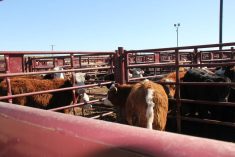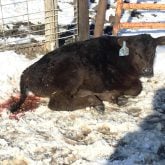Taiwan banned Canadian beef shipments again at the end of January after discovering traces of ractopamine in imported U.S. and Canadian beef. This has Canadian producers pulling their hair out. It is not just that ractopamine has been approved for use as a feed additive for hog and cattle production in more than 20 countries around the world including Canada, the U.S., Mexico and Australia, and that most countries at least have standards for maximum residue levels. This is another media fiasco, another argument we didn’t start, and yet another layer of administrative trade barriers. And guess what, there’s not much we can do about it.
Read Also

Treaty Land Sharing Network expands reach in Saskatchewan and Alberta
The Treaty Land Sharing Network, which connects land holders with First Nations and Metis people, has expanded since it began in 2018
Taiwan has been a pretty promising market for Canadian producers. Before the collapse of export markets in 2003, Canadian beef exports to Taiwan had risen to slightly over 4,000 tonnes, and over $20 million annually. Through the vigorous diplomatic efforts of then-executive director of the Canadian Trade Office in Taipei (CTOT) Gordon Houlden, an agreement for boneless under-30 month beef exports to Taiwan was reached in 2007. Sales to Taiwan crawled back to over 3,000 tonnes in 2010, comfortably exceeding 2009 numbers. We could have been forgiven for being optimistic.
After all, it is not as if Canada has been doing nothing. The Canadian Beef Export Federation (CBEF) has a highly active office in Taipei that maintains strong relationships with importers like MayFull, Shuh-sen, and Cooleagle that are connected not only to local distributors but also to a lucrative wet market. CBEF has also kept atop dramatically changing consumer tastes as the Taiwanese increasingly shop at chain supermarkets like Wellcome, Carrefour, and Costco. The organization also keeps an eye on our Australian, American, and New Zealand competitors in the Taiwan market.
By the summer of 2009, it looked like things were finally coming together for Canadian beef in Taiwan. The Oxford-educated and highly gregarious mayor of Taichung in central Taiwan had charmed the Canadian trade office in Taipei, convincing them to relocate their popular Canada Day celebration from Taipei County where it has been held for years. During the July 1 banquet at the swanky Hotel ONE, Mayor Hu made a big media splash when he held up a large Canadian steak in front of the CTOT executive director Ron Macintosh. No one would have predicted disaster was soon to strike again.
It started with a promising sign. In October 2009, the Americans convinced the Department of Health it was safe to open up the market to U.S. bone-in beef, ground beef, processed beef, as well as intestine, spinal columns, and brain from animals under 30 months. But Taiwan erupted, and furious legislators and consumers pounced on President Ma Ying-Jeou and Minister of Health Yaung Chih-liang for being bullied into an agreement by the Americans, and for putting political concerns over “citizens’ health.” The Consumers’ Foundation demanded that prion tests be conducted on imported beef, and a national referendum be held on imported U.S. bone-in beef. One protester even went up to the pastures above Taipei, found a cow-pie, made it into a “burger” and ate it in front of the presidential palace. Noodle shops in the Taiwanese countryside displayed prominent signs that they were using Australian, not American beef.
But most instructive was the reaction of the leaders of regional governments. Jason Hu mayor of Taichung, lost his enthusiasm for beef, and cooperated with other politicians from the south to ban American ground beef in schools. Mayor of Taipei and former professor of Institute of Food Science and Technology at Taiwan University Hau Long-Bin promoted the “Alliance for Rejecting American Beef Organs, Ground Beef and Spinal Columns.” Mayor Taipei County Chou His-Wei went so far as to warn that if the central government did not renegotiate the agreement, then the county would take the matter into its own hands and boycott American meat products.
The Canadian beef industry got sucked into the fray. Now backtracking, the Department of Health started to recognize some other perceived dangers. Opening up the market to American ground beef raised the possibility that Canadian grind could well be in the mix. The American Institute in Taipei (AIT) added fuel to the fire with a PR campaign from which it became hard for Canadians to distance themselves. AIT director William Stanton observed that 1,034 people died in motorcycle accidents in Taiwan in 2008 which made riding scooters in Taiwan much more dangerous than eating U.S. beef products. Plus, he said, WTO rules made it impossible to renegotiate the signed agreement. Minister of Health Yaung Chih-liang responded angrily, calling the comparison inappropriate. As far as renegotiating the agreement, he said his job was to eliminate possible risks to consumers.
To say that the AIT is the de facto U.S. embassy in Taipei does not quite capture its importance. AIT monitors a two-way trade between Taiwan and the U.S. worth almost $50 billion a year, and constantly nourishes a vast network of leaders in Taiwan’s universities, ministries, and companies who have graduated from top-tier U.S. universities. Once in a while, the AIT reminds the Taiwanese of the 1979 Taiwan Relations Act, which guaranteed the U.S. would supply Taiwan with arms of a defensive character should China try to take Taiwan back by force. You could call that a “negotiating position.”
Few Taiwanese would take the role of the director of the AIT lightly, as the organization is plugged into the sophisticated U.S. military and trade apparatus at the highest levels. So the scooter comment would have been stinging to Taiwanese ears.
In the end director Stanton and the AIT lost the battle, and the Legislative Yuan amended the Act Governing Food Sanitation on January 5, 2010, preventing bone-in beef imports from the U.S., and in the process put the Canadian agenda back a year or two and set the stage for the current controversy.
So what about the current ractopamine flap? Given the context, one might be forgiven for thinking Taiwan’s Ministry of Health and the central government was laying in wait for another health issue in the beef trade to gain back some credibility lost with the public. But what the Western media has not reported is that in December Taiwan’s weak central government again found itself in a position where it had to act.
On December 24, 2010, the scandal- driven APPLE DAILY, the publication responsible for blurring forever the line between the tabloid and mainstream media in Taiwan, reported that 24 farms had been searched in Zhanghua County. Over 700 transparent plastic bags of what appeared to be ractopamine had been found, and had been promptly seized by police. The producer of the ractopamine who was selling the substance to feed dealers and farmers was arrested, the paper reported.
Furthermore the pork from these farms had been shipped to Taipei and Taichung; just how many people had consumed the “problem” meat was “hard to estimate.” According to the APPLE, people in Zhanghua county were saying “black-hearted businessmen and pork farmers don’t care if others live or die. It is disgusting.”
So it was in this kind of volatile atmosphere that ractopamine was detected in 28 domestic chicken products, eight American meat products and one Canadian meat product on January 12, 2011. Back in the media spotlight, the Minister of Health Yaung Chih-liang said the agency’s position on zero tolerance for ractopamine would not change. However, there was only enough money in his budget to test five per cent of imported meat products.
The opposition party was on him like a pack of dogs. But his most vociferous critics were really the pork producers, livestock associations, and farmers outside Taipei organized by opportunistic legislators. Costco, Carrefour and the other chains responded by taking meat off the shelves.
A predictable ruckus with the AIT ensued. At the centre of the current controversy has been a series of public statements by its chairman Raymond Burghardt, the top U.S. official in Taiwan. He said the ractopamine flap created an atmosphere that was not conducive to the Trade and Investment Framework Agreement and the negotiations got put on ice. Then on January 25, Burghardt claimed the U.S. had “kept Taiwan in mind” during President Obama’s meetings with Chinese president Hu Jintao, by refusing to sign the fourth joint communique with China.
There are a couple of lessons to be learned from the ractopamine crisis. For one, the political landscape has shifted while we were not even paying attention.
When a delegation of MPs visited Taiwan last October, Portage-Lisgar MP Candice Hoeppner lobbied Taiwan President Ma Ying-jeou and Minister of Health Yaung Chih-liang to restore access for Canadian beef. However, it is hard to imagine a pair less able — or less inclined — to give Canada access to the market for bone-in beef in Taiwan.
On the other hand, regional politicians carry a clout that couldn’t have been imagined 20 years ago. They will go to almost unimaginable lengths to try to attract investments into their jurisdictions, and actively court foreign governmental organizations and business associations. At the same time, regional politician have the power to scuttle projects they don’t like. The adversarial relationship between regional governments and the central government grows every year: the three heavyweight politicians who stared down President Ma at the end of 2009 were all from his own Kuomintang party. Successful marketing strategies for Canadian beef in East Asia will involve regional governments more than they have in the past.
Finally, the ractopamine crisis has nothing to do with Canada’s trade office, and everything to do with the American Institute in Taiwan. To the extent we can avoid the politics, we should. Twenty years ago hard-ball power politics may have had the clout to get trade channels open in East Asia. Nowadays, it doesn’t.
BornonaSaskatchewanfarm,PaulSinclair hasaPhDineconomicsfromOsaka UniversityforForeignStudiesandhas workedinthePacificRimandAustralia. CurrentlyheisenrolledintheMBA programattheUniversityofAlbertaand maintainsaninterestinthefamilyfarm.
———
Ractopamine was detected in 28 domestic chicken products, eight American meat products and one Canadian meat product on January 12, 2011















